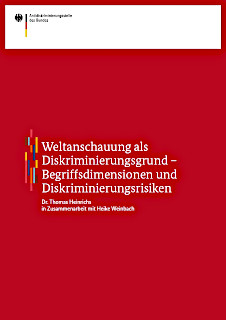Belief as grounds of discrimination
Conceptual dimensions and risks of discrimination
- Factsheet on the research project -
Authors: Dr Thomas Heinrichs - in collaboration with Professor Dr Heike Weinbach, published by the Federal Anti-Discrimination Agency (FADA) Year of publication: 2016
Brief overview
The article is meant to help clarify what shall reasonably be understood by the concept of 'belief' today and how it can be legally ascertained whether someone legitimately invokes his or her 'belief'.
Furthermore, it identifies the basic risks of discrimination in society for non-confessional people and those being non-religious. The article provides a comprehensive overview of the past juridical decisions concerning cases of discrimination based on belief and analyses the documentation of cases where people or organisations felt disadvantaged on grounds of their belief or their being non-religious.
Main results
From the perspectives of both, the constitution as well as European law, the legal concept of belief in an affirmative sense denotes an identity-forming perception of human life and the world which is binding for one's personal life conduct and also shared by a notable number of other people.
As a consequence of the freedom of any religion and belief in a negating sense, also the individual denial of any context of meaning, be it based on a religion or a secular belief, has to be construed as a belief to ensure comprehensive protection against discrimination based on religion or belief. Along these lines, being non-religious is protected by the freedom of belief, too.
The highest structural risk of discrimination for non-confessional people and those being non-religious consists in their not being religious, since they consequently run the risk of being classed as morally inferior due to the social dominance of religious concepts.
The analysis of the jurisdiction and the case documentation reveals that the risks of direct discrimination particularly exist in the fields of ecclesiastical employers and public education (nursery schools, schools, institutions of higher education).
The risks of indirect discrimination result from the German legislation on religion and belief being oriented towards the organisational form of the churches, thus making it difficult for beliefs which are differently organised to receive the same privileges as a religion that is organised like a church.
Options for action
Law
- There is a legal need for action in Section 19 of the General Act on Equal Treatment, where belief is not included as a ground for discrimination. A related amendment would be needed to ensure that religion and belief are equally protected against discrimination under civil law.
- There is additional legal need for action in Section 26 (6) sentences 2 and 3 of the North Rhine-Westphalia School Act (Schulgesetz NRW). This would need to be amended as well, as it is not permissible to tie the hiring of teachers at a school to their religious/ideological affiliation.
- The ordinances on »school absence« on religious holidays would also need to be amended. The holidays of ideological communities must also be taken into account. Currently, this mainly relates to the World Humanist Day on 21 June of each year.
- The provision in Section 9 of the General Act on Equal Treatment will be reviewed by the European Court of Justice (ECJ) due to the Federal Labour Court’s referral decision. The ECJ’s ruling may result in a change to the way the provision is currently handled in German case law on labour matters. In this case, there would be sufficient protection against discrimination also for church employees.
Institutions of higher education
Institutions of higher education should introduce humanistic studies as a course of study at least in those federal states (Länder) in which humanistic education is taught at schools to a relevant extent. Currently, this mainly applies to Berlin.
Public broadcasters
The rules on appointing members to the broadcasting boards would need to be amended as well. They should provide that, in addition to the churches, other relevant religious/ideological communities get a seat on these boards too.
Social discourse
Integrating an increasing plurality of religions and beliefs into our society requires an open discourse between religions and belief systems, which has already been initiated politically. In this regard, care must be taken to ensure that not only religions engage in dialogue with one another or with government and policymakers, but that those who hold certain beliefs participate in such dialogue as equals. Non-confessional people – where organisationally possible – should also be represented.

